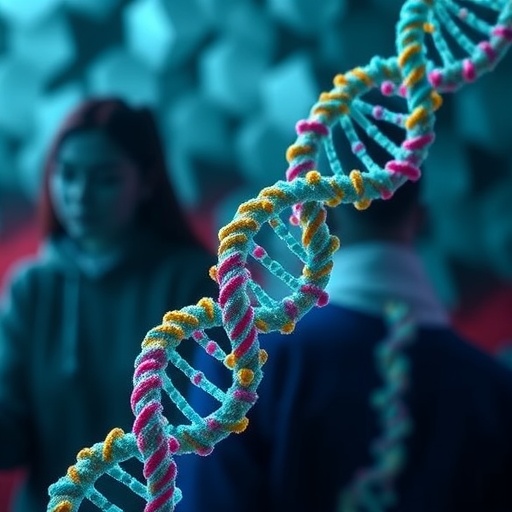In a groundbreaking study published in Scientific Reports, researchers have unveiled a novel zinc complex that could revolutionize cancer treatment by effectively inhibiting DNA replication in cancer cells. The study, led by researchers N. Maciejewska, J. Araškov, and M. Olszewski, demonstrates the therapeutic potential of quinoline-based thiazolyl-hydrazone compounds in targeting tumor growth. This innovative approach addresses one of the critical challenges in oncology: the need to disrupt malignant cellular processes while sparing healthy tissues.
The zinc complex introduced in the study acts as a powerful inhibitor of DNA replication, a fundamental process that is often misregulated in cancer cells. By binding to specific sites within the DNA, the compound disrupts the normal replication machinery of the cell, leading to cell death. This targeted inhibition provides a promising avenue for developing new anticancer therapies, particularly against aggressive and treatment-resistant cancers.
Quinoline-based thiazolyl-hydrazones are a class of organic compounds that have garnered attention for their diverse biological activities, including antioxidant, antimicrobial, and, most importantly, antitumor properties. The research team meticulously synthesized a series of these compounds, screening them for their ability to bind with zinc ions. Through rigorous testing, they identified a candidate complex that exhibited remarkable potency in preclinical models.
The findings emphasized the role of zinc as a crucial player in cellular homeostasis and DNA stability. Zinc ions are essential cofactors for numerous enzymes involved in DNA replication and repair. By creating a complex that disrupts zinc-dependent processes in cancer cells, the researchers provide a potential strategy to intentionally trigger replication stress and cellular apoptosis in tumors.
Targeting the mechanism of DNA replication has been a long-standing goal in cancer therapy. Current treatments often involve broad-spectrum chemotherapy agents that can affect both cancerous and healthy cells, leading to significant side effects. The zinc complex, by contrast, offers a more targeted approach, potentially reducing the adverse effects associated with traditional therapies. The hope is that by specifically disrupting DNA replication in cancer cells, patients may experience improved outcomes with fewer complications.
Moreover, the scalability of synthesizing these quinoline-based thiazolyl-hydrazones suggests that they could be produced economically for clinical trials. The researchers also explored the pharmacokinetics of their lead compound, assessing its stability and solubility, essential factors for any drug development. Promising results in these evaluations hint at a feasible pathway toward eventual clinical applications.
In addition to its DNA-targeting capabilities, the study sheds light on the mechanism by which the zinc complex exerts its therapeutic effects. Protein assays demonstrated that the compound induces conformational changes in DNA, leading to impaired replication fork progression. This finding is particularly significant as it highlights a novel pathway that has not been extensively explored in the context of anticancer drug development.
Furthermore, the research team plans to investigate the compound’s effectiveness in combination with existing chemotherapeutics. Preliminary analyses suggest that the zinc complex could enhance the therapeutic efficacy of conventional drugs by targeting additional cellular pathways involved in cancer progression. This combination strategy opens new avenues for more effective treatment regimens, potentially overcoming resistance mechanisms commonly seen in cancer therapy.
As the field of oncology continues to evolve, the utilization of metal complexes in drug design emerges as a promising frontier. The unique properties of zinc complexes could lead to the development of personalized therapies tailored to the genetic makeup of individual tumors. Personalized medicine has the potential to ensure that patients receive the most effective treatments, minimizing the trial-and-error approach often associated with cancer care.
The implications of this study could stretch far beyond just one compound; the methodology employed could be used to discover and develop additional zinc-based therapeutics targeting various forms of cancer. The research community is urged to further explore the extensive libraries of quinoline and thiazolyl derivatives to identify new candidates with enhanced efficacy and reduced toxicity.
With ongoing trials and future studies on the horizon, the excitement surrounding this research speaks volumes about the potential for novel agents that can transform cancer treatment. As the scientific community digs deeper into the interactions between metal complexes and biological systems, the hope is to deliver innovative solutions that not only improve survival rates but also the quality of life for cancer patients.
In summary, the work carried out by Maciejewska and colleagues represents a pivotal advancement in understanding how metal complexes can reshape cancer therapeutics. As researchers continue to elucidate the molecular intricacies of these compounds, we may soon witness a new chapter in oncological treatments—one that favors precision over a one-size-fits-all approach.
Subject of Research: Zinc complex with quinoline-based thiazolyl-hydrazone targeting DNA replication in cancer cells.
Article Title: Zinc complex with quinoline-based thiazolyl-hydrazone targeting DNA replication in cancer cells.
Article References:
Maciejewska, N., Araškov, Ј., Olszewski, M. et al. Zinc complex with quinoline-based thiazolyl-hydrazone targeting DNA replication in cancer cells.
Sci Rep (2025). https://doi.org/10.1038/s41598-025-27051-4
Image Credits: AI Generated
DOI:
Keywords: Zinc complex, DNA replication, cancer cells, quinoline-based thiazolyl-hydrazone, antitumor properties, therapeutic potential.




